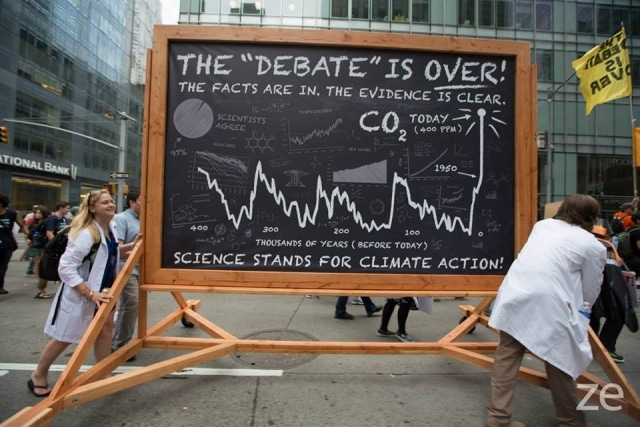Canadian oil and gas companies could be liable for billions of dollars of damages per year for their contribution to climate change caused by toxic greenhouse gas emissions, according to a study published Thursday.
The study looked at five oil and gas companies currently trading on the Toronto Stock Exchange — Encana, Suncor, Canadian Natural Resources, Talisman, and Husky — and found they could presently be incurring a global liability as high as $2.4 billion annually.
“Climate change is increasingly discussed not as some far-off threat but in terms of current realities,” said the 62-page study — Payback Time? What the internationalization of climate litigation could mean for Canadian oil and gas companies.
Published by the Canadian Centre for Policy Alternatives and West Coast Environmental Law (WCEL), the study found data showing the global financial cost of private and public property and other damage associated with climate change in 2010 has been estimated at $591 billion, rising to $4.2 trillion in 2030.
“That number is expected to increase dramatically in the coming years,” said the study written by Andrew Gage, WCEL staff counsel and University of British Columbia professor Michael Byers.
“In Canada, the National Roundtable on the Environment and the Economy has estimated that climate change will cost $5 billion annually by 2020. Given these significant costs, attention will inevitably shift to the issue of compensation and liability. In short, who will pay for the costs and damages caused by climate change, as well as the necessary adaptive measures?”
Fossil fuel companies and other large-scale greenhouse gas producers have contributed, globally, to trillions of dollars of damages related to climate change, Gage said in an accompanying media release.
“As with tobacco companies in the 1980s, these producers are confident the law will not hold them responsible for these damages,” Gage added.
“But rising levels of climate damage, increasing scientific evidence about the links between emissions and the damage they cause, and an emerging public debate about who is financially responsible for this damage, could change the situation very quickly.”
The most serious risk to Canadian companies is not litigation in Canada, the media release said. “Because the impacts and causes of climate change are global, climate damages litigation could take place in, and apply the laws of, any of the countries where damage occurs.”
Byers, Canada Research Chair in Global Politics and International Law, said substantial shifts will be required of large-scale greenhouse gas producers and their investors if they hope to manage the risk of climate damages litigation.
Those shifts include “moving away from fossil fuels, and supporting the adoption of international agreements that could link the reduction of liability risk to the provision of financial assistance or future emission reductions.”
The study concluded that the potential for climate damages litigation is global in scope.
“Cases could be brought in a large number of countries, under a wide range of legal theories, then enforced in Canada or other countries in which greenhouse gas producing companies have assets,” the study said.
“As a result, these companies and their shareholders are exposed to significant legal and financial risks — and these risks will only grow.”
In a telephone interview, Gage told DeSmog Canada that he is not aware of any successful climate damages litigation anywhere in the world, even in the highly litigious U.S.
“This is very new and in very early days but it is evolving fairly rapidly,” he said. “I would think there would be lawsuits of this type outside the U.S. within a couple of years but we’ll have to see.”
In a related commentary in Thursday’s Globe and Mail, Gage and Byers said climate change is no longer a distant threat.
“Canadian oil and gas companies could soon find themselves on the hook for at least part of the damage,” they wrote. “For as climate change costs increase, a global debate has begun about who should pay.”
They also noted Nobel Peace Prize laureate Desmond Tutu recently called on global leaders to hold those responsible for climate damages accountable.
“Just 90 corporations – the so-called carbon majors – are responsible for 63 per cent of CO2 emissions since the industrial revolution,” Tutu was quoted as saying. “It is time to change the profit incentive by demanding legal liability for unsustainable environmental practices.”
Image Credit: Zack Embree
Subscribe to our newsletter
Stay up to date with DeSmog news and alerts






